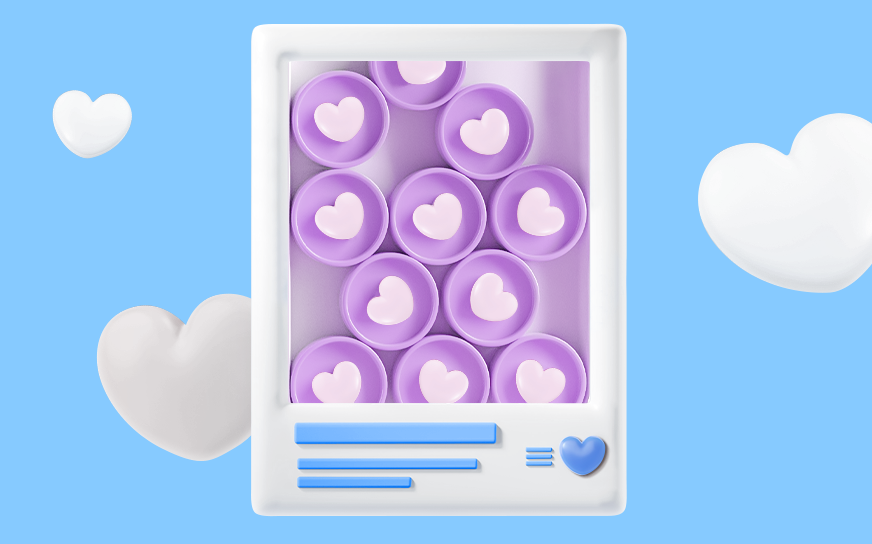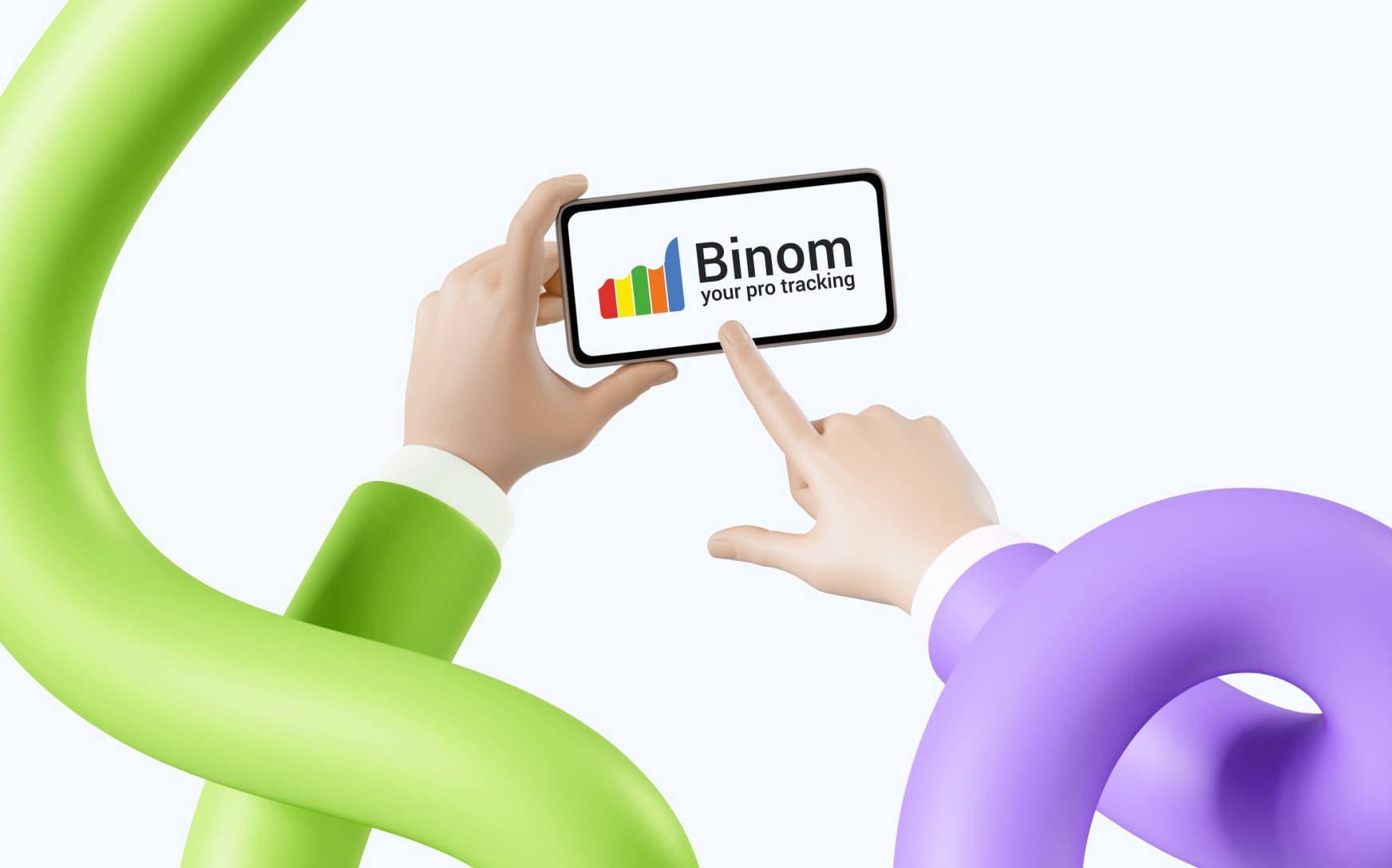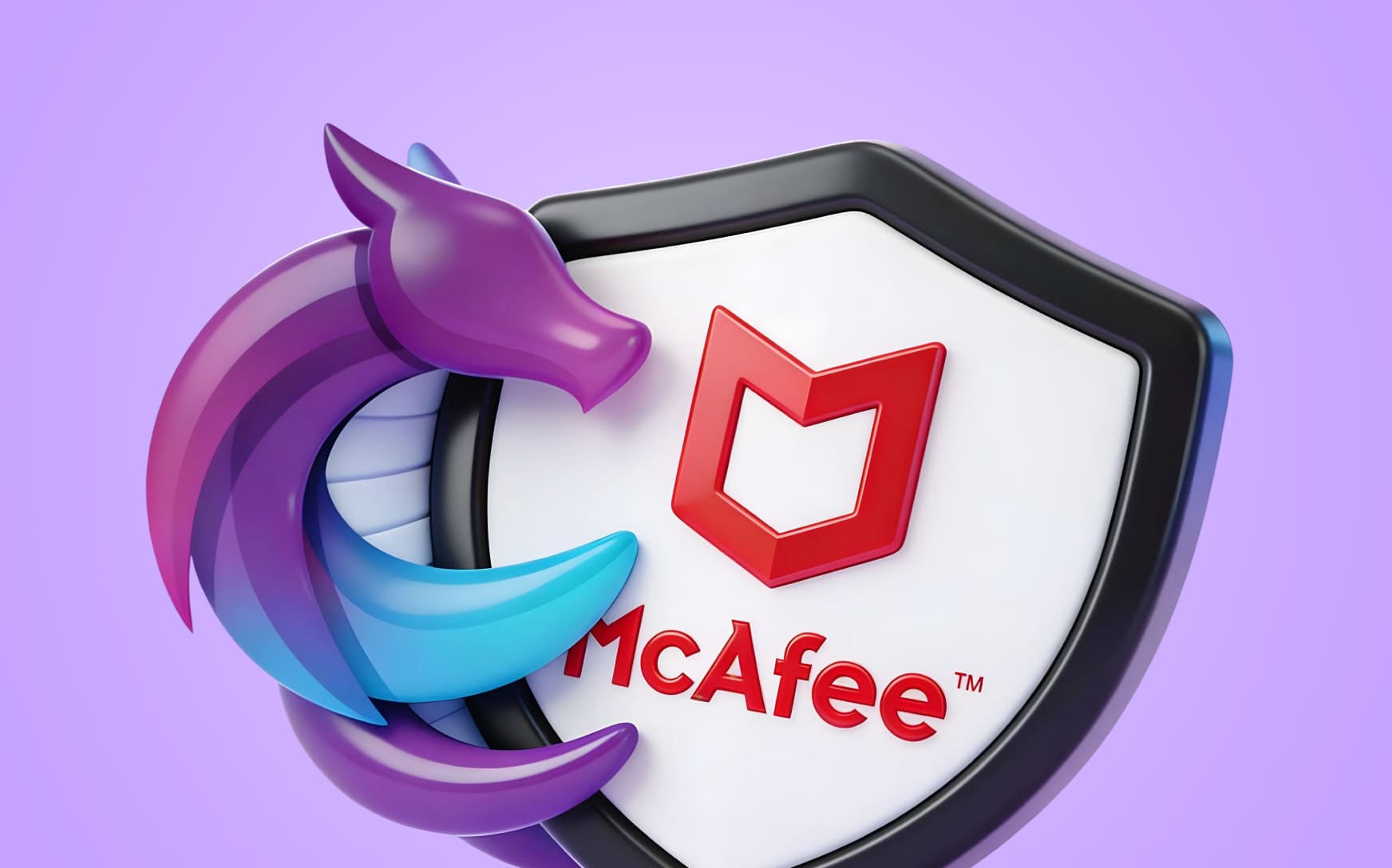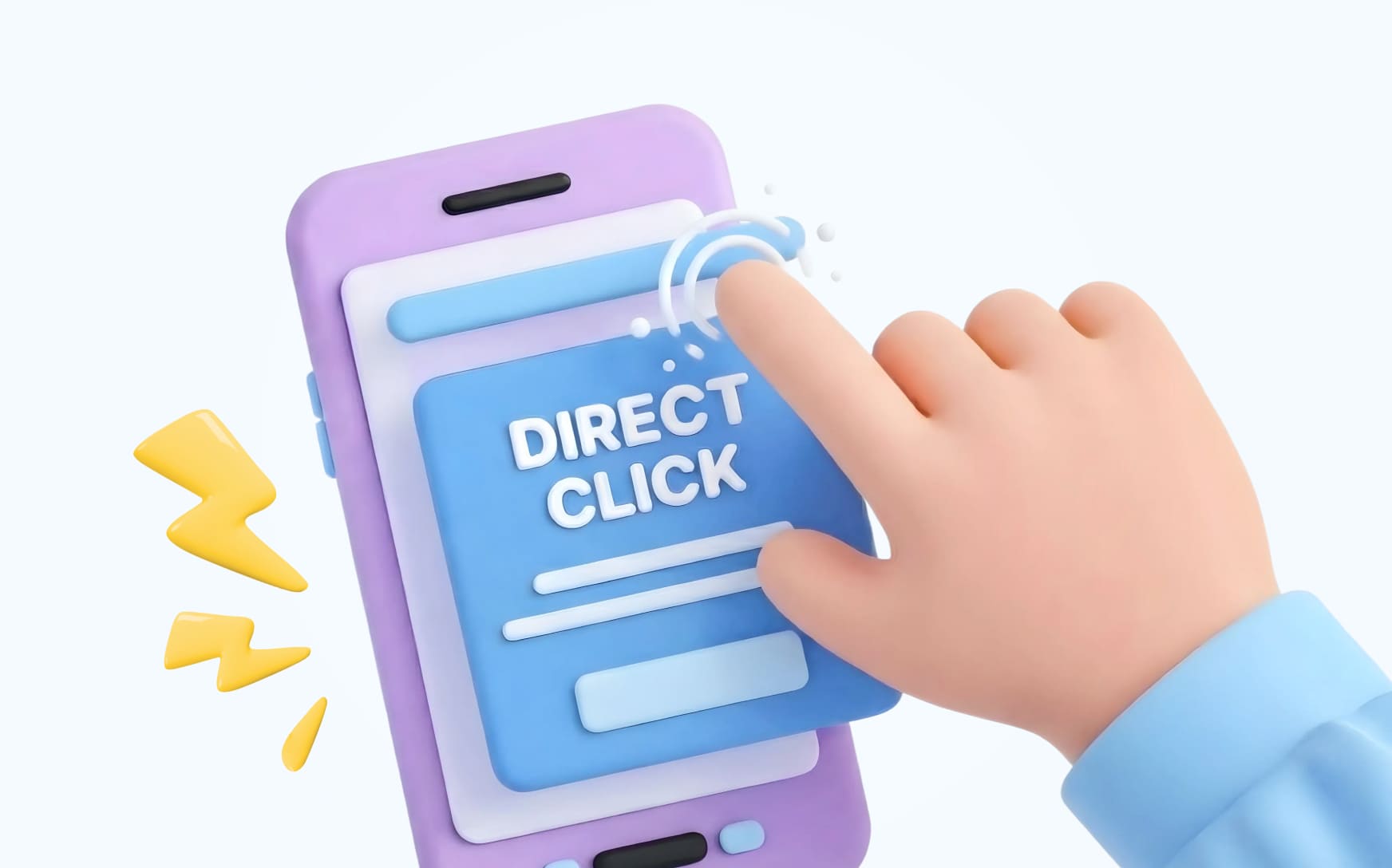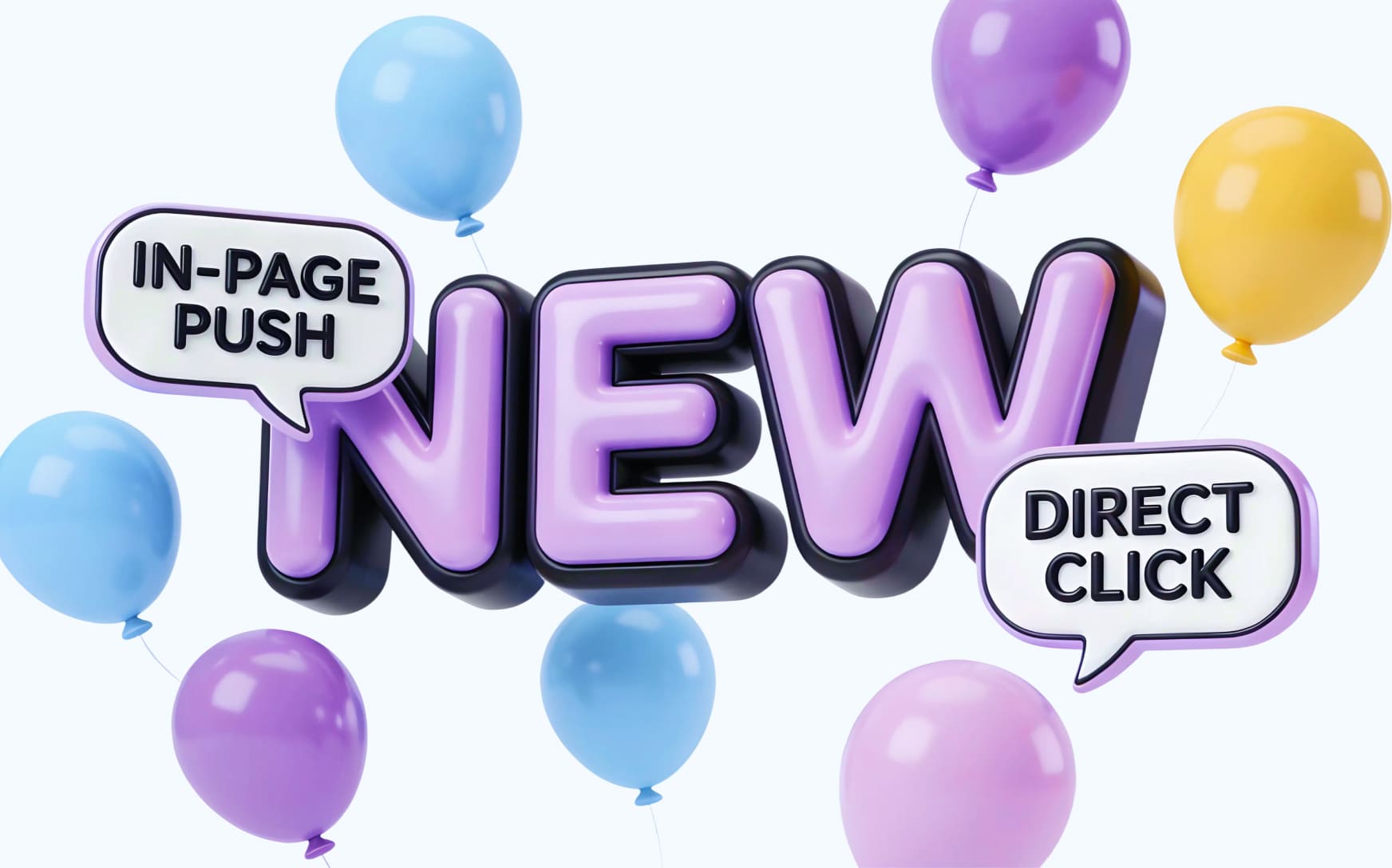The dating vertical is one of the most stable and versatile in the world of traffic arbitrage. Of course, it has its own nuances and key differences from other niches. By understanding them, you’ll be able to launch advertising campaigns in this vertical like a pro. That’s exactly why we, the experts at ROIads ad network, have prepared a comprehensive guide for you.
In this material, we will break down what “dating” entails, the key aspects of launching such campaigns, what to pay attention to when creating creatives, and how to avoid mistakes during the launch. This article also covers different types of push notifications for dating offers, helping you tailor your creatives based on audience intent and offer style.
Understanding the Dating Vertical: Key Differences Between Mainstream and Adult Dating Promotion
The dating vertical in affiliate marketing refers to all online platforms and services that help people connect for romantic, casual, or social relationships. This vertical can be highly profitable due to its global demand and emotional appeal. Dating offers typically fall into two major categories: mainstream dating and adult dating.

1. Mainstream Dating
Mainstream dating refers to platforms that focus on helping people form relationships that are typically more socially acceptable and geared towards general audiences. These services are usually intended for individuals seeking serious relationships, friendships, or casual dating in a respectful and safe environment. Some key characteristics of mainstream dating offers include:

- Wide Audience:
Platforms like Tinder, OkCupid, and Bumble target a broad demographic, appealing to people looking for romantic or platonic relationships. - Mobile Apps and Online Platforms:
The popularity of mobile-first dating apps has grown tremendously, making it easy for users to swipe, chat, and connect instantly. - Target Demographics:
Mainstream dating can cater to niche audiences within general dating, like seniors, single parents, or specific religious groups (e.g., Christian Mingle, JDate). - Emphasis on Safety and Privacy:
These platforms usually highlight user safety, consent, and respectful interactions as major priorities .
2. Adult Dating
Adult dating, on the other hand, focuses on more explicit or casual encounters and is geared toward users seeking sexual relationships rather than long-term commitments. These offers are often referred to as “adult” or “casual dating” platforms and can involve more mature or risqué content. Some characteristics of adult dating verticals include:
- Explicit Content:
Adult dating platforms may include provocative imagery and language, and are often designed to appeal to individuals looking for hookups, casual encounters, or specific fetishes. - Audience Segmentation:
The audience for adult dating is typically more focused and segmented by preferences, age, or interests in various types of adult content or encounters. - Higher Conversion Potential:
Due to the nature of the content, adult dating offers often experience higher engagement and conversion rates but come with stricter compliance and advertising limitations .
Let’s summarize the key distinguishing features of the different types of dating. Understanding these differences is extremely useful for affiliate marketers, as both of these varieties have their own nuances in positioning and launching advertising campaigns.
So, mainstream dating appeals to a wider group of people, focusing on those looking for serious relationships or friendships. In contrast, adult dating is aimed at users who want casual, often more explicit connections. Mainstream platforms focus on safety and long-term goals, while adult sites use more provocative content to attract people. Additionally, adult dating usually has stricter advertising rules and fewer places to promote compared to mainstream dating, which can advertise more freely.
The Benefits of Push Ads and How to Promote Dating Offers Effectively
If you’re wondering how to promote dating offers with better ROI, push ads provide a flexible, high-volume format that works well for both mainstream and adult push traffic.
We’ve covered the main concepts related to different types of the dating vertical. Now, it’s time to understand why push ads are the perfect format for driving traffic in this niche.

- Push ads are noticeable and highly engaging — they’re sent directly to the user’s device, regardless of whether they’re currently browsing or not. The message won’t disappear until the user interacts with it, which significantly boosts CTR.
- Global reach and low cost — push ad prices in ad networks are quite affordable, making them one of the cheapest traffic sources. For instance, on ROIads, prices start at $0.003 per click. Combined with the large amount of traffic in the dating vertical and high audience demand, push ads become one of the best options for launching campaigns.
- Flexibility and deep personalization — push creatives are easy to customize using images, text, and CTA buttons. Tokens like {city} or {country} in creatives allow you to send personalized push notifications to each user based on their location, positively affecting engagement.
Steps for Advertising Dating on Push Ads
We’ve established that the combination of “push ads” + “dating” is a great opportunity for advertisers to run dating on push ads profitably. Now, let’s explore the steps that follow after choosing an adult offer in a CPA network and launching the campaign in an ad network.
Step 1: Choosing Geo for Launching
First, we need to decide which countries to target with traffic. This will influence the campaign’s budget, creative approaches, and overall positioning. Geos are typically divided into three groups: Tier 1, Tier 2, and Tier 3.
- Tier 1
Tier 1 includes the USA, Canada, the UK, Australia, and Western Europe. These countries are considered the most challenging due to high competition and the highest cost per click, but the profits here can also be greater. We recommend launching dating campaigns in these geos only for experienced advertisers to avoid burning through the budget. In these countries, the most important factors are personalized ads and a focus on safety and privacy.
- Tier 2
This tier includes Eastern Europe, South Korea, some parts of Latin America, and a few Asian countries. Here, the competition and traffic costs are lower, but you can still achieve impressive results due to the large volumes of traffic. In this tier, localized creatives work even better for conversions, as most people in these regions do not speak English.
- Tier 3
This group includes all other countries that didn’t make it into the first two tiers — countries in Africa, as well as certain regions in Asia and LATAM. The cost of traffic here is the lowest, making it an ideal starting point for beginners looking to gain experience and drive large amounts of traffic for little money. When it comes to creative approaches, localization and testing are critical — user interests may differ significantly from Tier 1 and Tier 2 countries.
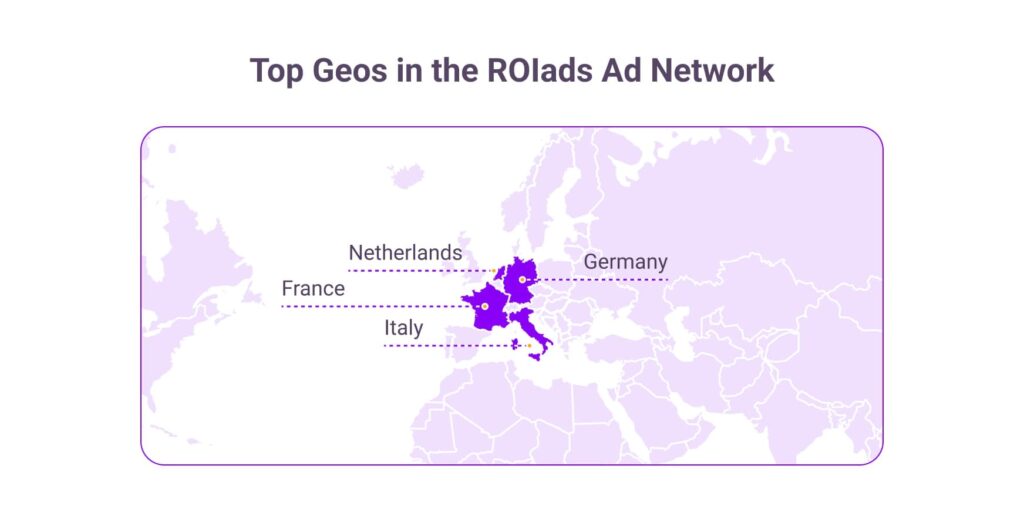
In our ad network, the top-performing geos include Germany, France, Italy, and the Netherlands, where we provide large volumes of premium traffic to ensure maximum conversions. Additionally, we have significant traffic from Tier 2 and Tier 3 countries due to our global reach, allowing you to launch campaigns in any region and adjust them flexibly.
Step 2: Crafting Creatives
The first thing a user interacts with in your ad campaign is the creatives, followed by the pre-landing and landing pages. Therefore, it’s crucial to make your push ads as engaging as possible so the user feels a strong urge to click on them. Below, we’ll explore four main creative techniques with examples designed to boost engagement and conversion.
- Simulate Personal Messages and Create Intrigue
A great idea is to create the illusion of real communication. For example, using a name like “Maria” and a status such as “Online,” along with a message about new notifications, naturally piques the user’s curiosity to find out what has been sent to them. Adding a photo enhances the effect of “intimate” communication. This approach works well for grabbing attention, as it gives the impression that a real person is interested in connecting with the user. This technique stirs curiosity and encourages clicks. Adding a play button icon can also simulate interactivity, further boosting CTR.

- Use Brands and Emojis for a Native Feel
In the second example, the logo of the popular dating app Tinder is used, which builds trust and creates an association with a well-known brand. The text “Jane sent a message,” accompanied by emojis, adds an extra layer of emotion and informality to the communication. The image of a girl relaxing on a bed evokes feelings of comfort and approachability, motivating the user to engage. This type of creative works well for a native feel and piques curiosity for further interaction.

- Message with a Question and Profile Image
In the third example, the user sees a notification with the question “Do you like my photo?” along with a messaging app interface, which also simulates a personal conversation. The photo of the girl adds a sense of realism and encourages the user to “respond” to the suggested interaction. These elements are designed to make the user feel like they’re engaging in a real communication process.

- Personalize the Creative and Indicate Distance
In this creative, the name “Anna” is used along with the exact distance from the user (876 meters). The distance feature is common in dating services, and this technique creates a sense of proximity and accessibility, making the offer more appealing. This type of creative enhances personal engagement, as users feel that someone “nearby” is interested in them. Subtle details, such as age, further strengthen the personalization effect.

Step 3: Setting Targeting
Proper targeting is the key to effective dating promotion. Since most users of modern dating apps and websites prefer mobile devices, it’s essential to focus on mobile targeting. However, don’t overlook desktop users. Here are a few key targeting tips for the dating vertical:
- For mobile traffic, focus on Android 8-14 and iOS 17 — this will cover both users of older devices (Tier 2/3) and the more affluent audience in Tier 1 countries.
- While mobile dominates the dating vertical, desktop traffic can still be valuable, especially in Tier 1 countries.
- For desktops, Windows 10-11 is an excellent choice for reaching users who work from their computers.
- As for browsers, Chrome and Safari provide the widest reach across both mobile and desktop devices. Samsung Internet is relevant for Android users, and Edge is important for Windows users.

Step 4: Setting Bids and Budget
Proper budget allocation and accurate bid settings are key to the success of any ad campaign, especially in the dating vertical where competition for user attention is intense. Let’s break down this aspect in detail.
- Determining the Budget
Before launching the campaign, it’s important to calculate the budget for testing and analysis correctly. It is recommended to allocate a budget equivalent to 10-15 target conversions (CPA) to gather enough data for optimization. For example, if a conversion costs $2, the initial daily budget should be $20-$30. Keep in mind, we don’t recommend setting a daily budget below $25 to ensure a stable traffic flow and accurate analysis of results.

2. Bids and Their Setup
The bid determines how much you’re willing to pay per click or per thousand impressions. It’s crucial to find the right balance — bidding too high will drain your budget quickly, while bidding too low will limit the amount of traffic you can acquire.
- For Tier 1 countries (e.g., Germany, France), bids are higher due to strong competition, but the traffic quality is also better. It’s recommended to start with the average bid suggested by the ad network and gradually increase it if you’re not receiving enough traffic.
- For Tier 2 and Tier 3 countries, bids can be significantly lower, allowing you to get large volumes of traffic for less money. However, traffic quality might be lower, which will require more careful optimization.
3. Traffic Distribution Over Time
To ensure a balanced distribution of traffic throughout the day, it’s recommended to use the frequency capping feature. This will help prevent your campaign from burning through the entire budget in the first few hours. For example, setting a frequency cap of 1-2 impressions per user per day will allow you to reach more unique users while preserving traffic until the end of the day.

4. Bid Optimization
Using tools like automated bid rules and micro-bidding will help optimize spending and increase conversions. Micro-bidding allows you to adjust bids at the level of individual traffic sources, reducing spend on underperforming sources and increasing the budget for those delivering strong results. This is especially useful for Tier 2 and Tier 3 countries, where it’s not just about buying cheap traffic but also improving its quality. Remember, in ROIads, you can request custom white and blacklists from your personal manager tailored specifically to your campaign.
5. Consider Audience Activity
Different target audiences are active at different times of the day. For maximum effectiveness, it’s important to adjust your budget based on the peak activity hours of users in your chosen geo. For instance, in Germany and France, user activity may be higher during the morning and evening, while in Tier 3 countries, user activity might peak at night. To fine-tune the timing of your ads, we offer a “Scheduling” feature, which allows you to set detailed show schedules.

Using ROIads for Dating Promotions
By segmenting your traffic sources and optimizing creatives, you’ll learn how to convert dating offers with push notifications more efficiently. ROIads offers a reliable platform for dating campaigns, providing competitive pricing, premium traffic sources, and advanced targeting options. With wide global reach and specialized support for push ads, ROIads helps maximize your ROI with optimized traffic flow.
A standout feature of our ad network is its AI-driven bidding technology, which automatically optimizes traffic sources based on performance. This means your campaigns can achieve a higher ROI without manual intervention.
Check out all ROIads features below:
ROIads team also runs an expert blog packed with case studies, practical tips and insights for every vertical and format, helping advertisers launch.
Common Mistakes to Avoid When Promoting Dating Offers on Push Ads
Promoting dating offers through push ads can be highly effective and profitable, but beginners often make several common mistakes that can significantly reduce campaign efficiency. Here’s what to watch out for:
- Incorrect Targeting
The mistake — launching ads without precise targeting by age, gender, and interests. This leads to irrelevant leads and a low ROI.
- Weak Creatives
Poor-quality images and copy reduce user interest. Creatives should be engaging and relevant.
- Lack of Testing
Without A/B testing, it’s hard to identify effective creatives and strategies. Testing is key to success.
- Non-Optimal Budgeting
The mistake — overspending on ineffective sources. The budget needs to be reallocated to better-performing channels.
- Improper Frequency Capping
Too frequent notifications annoy users. It’s crucial to include this parameter and maintain a balance to avoid negative reactions and wasted budget.
- Lack of Localization
Ignoring ad adaptation for different regions lowers conversion rates. Localizing text and creatives for the culture and language of your target audience is a vital step toward success.
By avoiding these mistakes, you can significantly improve the effectiveness of your dating offer push ad campaigns. If you still have questions about the technical nuances of setting up push campaigns, we highly recommend our comprehensive step-by-step launch guide.
Guides for Launching Push Campaigns in Other Verticals
We also have many helpful guides on other verticals in our blog. Read them to run ads like a true pro. Our recommendations will help you avoid mistakes and improve the effectiveness of your campaigns!
- How to Advertise Antivirus on Push Ads
- How to Advertise Betting on Push Ads
- How to Promote Gambling on Push Ads
- How to Advertise Nutra on Push Ads
Conclusion
Promoting dating offers through push ads requires attention to detail and avoiding common mistakes. Use our tips and discover ways to promote dating on push ads to optimize your campaigns and achieve better results.
Use these strategies to master push notifications to convert dating offers, whether you’re targeting casual users or running large-scale adult push traffic campaigns.
Ready to launch a successful campaign? Register with ROIads and start earning today!
